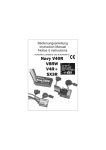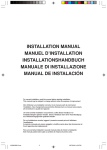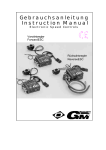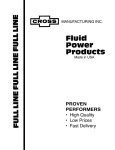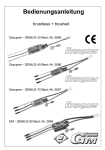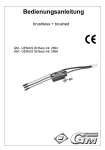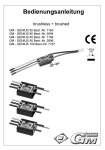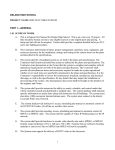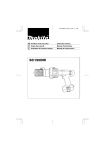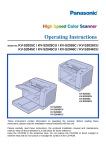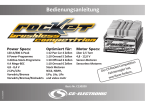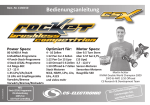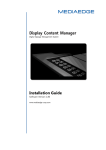Download Anleitung - Graupner
Transcript
Bedienungsanleitung Instruction Manual Notice d instructions VORWÄRTS, BREMSE UND RÜCKWÄRTS: Navy V40R V8RW V4R+ SX3R Herzlichen Glückwunsch zum Kauf Ihres Digital Fahrtenreglers. Mit diesem Regler setzt Dipl.-Ing. (FH) Ralf Helbing die Reihe seiner erfolgreichen Fahrtenregler fort, mit denen schon Welt- und Europameisterschaften, sowie nationale und internationale Titel gewonnen wurden. Wichtiger Hinweis: Bitte lesen Sie diese Anleitung vor Gebrauch Ihres neuen Fahrtenreglers sorgfältig durch. Nur so nutzen Sie das gesamte Potential Ihres Reglers und vermeiden Fehler bei der Bedienung. Beschreibung: Die Fahrtenregler sind nur mit den modernsten Bauteilen bestückt. Besonderer Wert wird hierbei auf Funktionalität, Lebensdauer, Stand der Technik und Design gelegt. Die Regler sind bereits mit den extrem hochwertigen SMD-FETs ausgestattet. Diese FETs sind außerordentlich klein und verlustarm. Die von unserem Team ständig weiter entwickelte Software garantiert in erster Linie präzise Einstellungen, hier insbesondere Nullpunktjustierungen: Es kann keinerlei mechanische Abweichungen geben, da alles digital gespeichert und gesteuert wird. Das einfache ‘ProgrammierSystem’ ermöglicht Ihnen das Einstellen des Reglers innerhalb von Sekunden ohne überflüssige Zusatzmittel wie Chips, Programmiergerät oder dergleichen. 2 Gebrauchsanleitung Englisch Derections 11 Notice d´instructions 21 Inhaltsverzeichnis Installation / Einbau des Reglers Anschluss des Reglers Einstellen auf den Sender Rückwärtsfunktion bei ..R - Reglern Zusatzfunktionen Technische Daten Anschluss eines FET-Servos Hinweise Warnhinweise Garantie 4 4-5 5 6 7-8 8 9 9 10 30 3 Installation / Einbau des Reglers ins Modell Nachdem Sie den Regler ausgepackt haben, überlegen Sie sich 13 bitte, an welcher Stelle des Modells Sie ihn platzieren wollen. Wir empfehlen, den Regler möglichst tief zu platzieren. Beachten Sie dabei bitte, dass der Empfänger sowie die Empfängerantenne möglichst mehr als 3 cm Abstand zum Fahrtenregler, den dicken, stromführenden Kabeln sowie dem Akku haben sollte. Wenn möglich, platzieren Sie den Regler bitte auch so, dass etwas Fahrtwind an ihn kommen kann. Dies steigert die Leistungsfähigkeit des Reglers. Nachdem Sie sich für eine geeignete Stelle entschieden haben, fixieren Sie bitte den Regler mit doppelseitigem Klebeband. Anschluss des Reglers Anschluss von Akku und Motor: Verbinden Sie das blaue Kabel mit dem Minuspol des Motors Verbinden Sie das gelbe Kabel mit dem Pluspol des Motors Verbinden Sie das rote Kabel mit dem Pluspol des Fahrakkus Verbinden Sie das schwarze Kabel mit dem Minuspol des Plus Fahrakkus Den langen Draht mit dem Akku + Kabel verbinden Anschluss eines Power-Kondensators: Minus Den kurzen Draht mit dem Akku Kabel verbinden Kennzeichnung des Minuspols Best.-Nr. 91539 oder 91539.G Der Anschluss eines Power-Kondensators ist vorteilhaft. Er verringert Störeinflüsse des Motors, schützt den Regler vor Überspannung und verbessert die Beschleunigung. Der lange Draht des Kondensators wird am Akku+ Anschluss des Reglers angelötet. Der kurze Draht des Kondensators (Kennzeichnung -) wird am Akku- Anschluss des Reglers 4 Anschluss an den Empfänger Ihr Regler ist werkseitig mit einem JR-Stecker bestückt. Erkundigen Sie sich bei Ihrem Fachhändler, ob Ihr Empfänger mit diesem Stecksystem kompatibel ist, da sonst der Empfänger und das BEC des Fahrtenreglers zerstört werden kann. Tausch des Steckers oder Polung ROT = Empfänger + Widerhaken BRAUN = Empfänger wegdrücken und rausziehen ORANGE = Impulsleitung Stecken Sie den Stecker des Danach Widerhaken Einbaubeispiel wieder etwas Empfängerkabels in Kanal 2 Ihres zurückbiegen Empfängers. Einstellen auf den Sender Anschließend Kabel in den neuen Stecker einführen Nach dem ersten richtigen Einstecken und nach dem Einschalten ist der Regler eingeschaltet und hat eine Grundeinstellung. Um den Regler auf Ihre Fernsteuerung einzustellen, gehen Sie wie folgt vor: Hinweis: Bei jedem Tastendruck leuchtet die LED kurz auf, damit Sie wissen, dass die Taste erkannt wurde. Während der Einstellung auf den Sender läuft der Motor nicht. - Drücken Sie kurz die Taste “SET” - Der Regler ermittelt nun automatisch den Nullpunkt und die LED leuchtet. Nach etwa zwei Sek. erlischt die LED. - Gehen Sie nun innerhalb ca. 3 Sek. auf die Knüppelstellungen Vollgas, danach Vollbremse/Vollrückwärts. - Wenn Sie nun die ‘SET’ Taste drücken, bis die 3 kurzen LED Blinkzeichen erscheinen, werden alle Zusatzfunktionen auf die Werkseinstellungen zurückgesetzt. - Der Einstellvorgang ist beendet, wenn 3 kurze LED Blinkzeichen das Ende des Set-Programms anzeigen. Fertig! Ihr Regler ist nun schon eingestellt. Bei richtiger Einstellung leuchtet die LED nun bei Vollgas , Nullpunkt und Vollbremse! Werkseinstellung (außer NavyV40R): BRKMIN 0%, BRKMAX 100%, AUTOBRK 0%, REVERSE 100%, Zeit bis Rückwärts: 98, Powerkurve: linear, Rückwärts bei Motorstillstand Werkseinstellung Navy V40R: BRKMIN 0%, BRKMAX 100%, AUTOBRK 0%, REVERSE 50%, Zeit bis Rückwärts: 4, Powerkurve: linear, Rückwärts bei Motorstillstand 5 Beachten Sie bitte immer folgende Reihenfolge: Einschalten: Ausschalten: 1. Fernsteuerung einschalten 2. Regler einstecken 3. Regler einschalten 1. Regler ausschalten 2. Regler ausstecken 3. Fernsteuerung ausschalten Rückwärtsfunktion bei ...R Reglern Diese Fahrtenregler haben sowohl eine voll proportionale Bremse als auch einen voll proportionalen Rückwärtsgang. Es gibt verschiedene Möglichkeiten den Rückwärtsgang zu aktivieren: 1. Um rückwärts fahren zu müssen Sie zuerst den Gashebel auf die Position “Vollbremse” und dann zurück zur Neutralstellung bringen. Der Rückwärtsgang ist nun eingelegt. Nun können Sie proportional rückwärts fahren. 2. Um rückwärts fahren zu können muss das Fahrzeug annähernd stehen und der Gashebel auf Neutral stehen. Nun können Sie proportional rückwärts fahren. (Rückwärts bei Motorstillstand) 3. Nach der eingestellten Zeit wird die Bremse für die Rückwärtsfahrt umgeschaltet. (Zeit bis rückwärts: 0 - ca. 5 s) Die Möglichkeit 1 lässt sich mit Möglichkeit 2 und/oder 3 kombinieren. Siehe Programmierung Programm #5 und #6 auf den folgenden Seiten. Wichtiger Hinweis: Bitte achten Sie darauf, dass Sie bei Verwendung eines Rückwärtsreglers keine Schottky-Diode an den Motor anschließen! Der Regler wird sonst zerstört, wenn Sie rückwärts 6 Zusatzfunktionen: Programmnummern der über den Taster einstellbaren Funktionen: Programmnummer #1 #2 #3 #4 #5 #6 Programm BRKMIN BRKMAX AUTOBRK REVERSE Zeit bis rückwärts Powerkurve, Rückwärts bei Motorstillstand #1: Minimale Bremse BRAKE MIN Die Minimale Bremswirkung ist die, die unmittelbar nach dem Neutralpunkt ansteht. Beispiel: Wenn Sie die min. Bremse auf 30% einstellen, dann stehen beim Betätigen der Bremse sofort 30% Bremse an. Der Bremsbereich des Hebels ist somit zwischen 30% und BREMSE MAX aufgeteilt und damit sensibler. Die minimale Bremse ist zwischen 0% und 100% einstellbar. (0% ab Werk) (sinnvolle Werte: 0-50%) #2: Maximale Bremse BRAKE MAX Die maximale Bremswirkung ist die, die bei Vollbremse ansteht. Mit dieser Überbremsen/Blockieren der Räder bei Vollbremse verhindern. Die maximale Bremse ist zwischen 0% und 100% einstellbar. (100% ab Werk) Tip: Die meisten Fahrer fahren die Maximale Bremse bei ca. 80%. Funktion lässt sich ein #3: Automatikbremse AUTOBRAKE Die Automatikbremse ist von 0-100% einstellbar und wirkt bereits bei Neutralstellung des Gashebels. Sie ist unabhängig von der minimalen und maximalen Bremswirkung einstellbar und erlaubt daher ein engeres Kurvenfahren.. (0% ab Werk) (sinnvolle Werte: 0-30%) #4: Maximale Rückwärtsfahrt REVERSE Die maximale Rückwärtsfahrt ist von 0-100% getrennt von der Bremse einstellbar. Dadurch wird ein vorbildgetreues Rückwärtsfahren erlaubt. Bei Booten kann ein Abtauchen des Bootes durch Verringerung der maximalen Rückwärtsfahrt auf ca. 50% vermieden werden. (100% ab Werk, bei Navy V40R 50% ab Werk) (sinnvolle Werte: 30-100%) #5: Zeit bis rückwärts Die Zeitverzögerung für die Rückwärtsfahrt kann unabhängig von den anderen Rückwärtsgangfunktionen eingestellt werden. 0 = keine Zeitverzögerung (besonders für Trailmodelle in Zusammenhang mit 100% Automatikbremse) 1...9 = Zeitverzögerung ca. 0,5-5s 10 = der Rückwärtsgang wird nicht von der Zeitverzögerung aktiviert #6: Powerkurve, Rückwärts bei Motorstillstand akt./deakt. Im Programm 6 kann die Powerkurve, Gaskurve für das Regelverhalten im Halbgasbereich eingestellt werden. Linear = linear proportional Soft = ähnlich wie exponential - , besonders für Off-Road und rutschigen Untergrund Hart = ähnlich wie exponential+, besonders für Stock-Rennen Weiterhin kann die Funktion der Rückwärtsgangaktivierung im Nullpunkt bei Motorstillstand aktiviert oder deaktiviert werden. Rückwärts bei Motorstillstand akt. Kurve deaktiviert. Kurve Wertetabelle: 0 linear 4 linear 1 soft 5 soft 2 hart 6 hart 3 hart 7 hart 7 Programmieren der Zusatzfunktionen mit dem Taster - Regler aus - Sender einschalten - SET Taste drücken und gedrückt halten und gleichzeitig den Regler einschalten, bis die LED 3 x kurz blinkt. - während der oben genannten Blinkzeichen Taste loslassen … Sie befinden sich nun im Programmmodus, Sie haben nun ca. je 3sek. Zeit um das gewünschte Programm auszuwählen, ansonsten wechselt das Programm nach ca. 3sek. in den Wertemodus. Programmübersicht PROG WERTE 0-1-2-3-4-5-6-7-8-9-10 #1 BRKMIN 0 10 20 30 40 50 60 70 80 90 100 #2 BRKMAX 0 10 20 30 40 50 60 70 80 90 100 #3 AUTOBRK 0 10 20 30 40 50 60 70 80 90 100 REVERSE 0 10 20 30 40 50 60 70 80 90 100 #5 Zeit bis R 0 10 20 30 40 50 60 70 80 90 OO - - #4 #6 POWERCURVE Rückwärts bei Motorstillstand Lin.. Soft Hart Hart Lin. Soft Hart Hart akt. akt. akt. akt. De- De- de- Deakt. akt. akt. akt. - - Drücken Sie dazu gemäß unten stehender Tabelle die SET Taste so oft, bis Sie das gewünschte Programm erreicht haben. Bei jeder Erhöhung des Programms leuchtet die LED. - Nach dem letzten Tastendruck bestätigt der Regler nach ca. 3s das Erreichen des Programms mit 3 kurzen Blinkzeichen. - Gleich danach zeigen 3 weitere Blinkzeichen der LED das Erreichen des Wertemodus an. Sie können nun die Taste (Werte in der Tabelle) so oft drücken, bis der gewünschte Wert eingestellt ist. Bei jeder Erhöhung des Wertes leuchtet die LED. - Der Regler bestätigt wiederum mit 3 kurzen Blinkzeichen und kehrt zum Fahrmodus zurück. - Fertig! Technische Daten: Navy V40R V8RW SX3R V4R+ Betriebsspannung: R(DSon) in Ohm bei 25°C Strom kurzzeitig 10s Dauerstrom* Windungen bei GM-Motoren BEC Spg./Strom max. 10s 4,8-16,8V 2x0,001 120A 40A/60A wasserg. >=10T 5,5V/3A 4,8-12V 4,8-12V 4,8-12V 2x0,0007 2x0,003 2x0,002 120A 60A 60A 60A 20A 32A >=8T >=18T >=15T 5,5V/3A 5,5V/2A 5,5V/3A *Der Dauerstrom bezieht sich auf Akkus mit max. 3600mAh. 8 Anschluss eines FET-Servos Bei Verwendung eines FET-Servo mit zusätzlicher Spannungsversorgung, schließen Sie das blaue FET-Servo Kabel an Akku-Plus an. Oftmals wird eine Spule benötigt. Lesen Sie dazu die Hinweise des Servo - Herstellers. Hinweise: FBei unzureichender Kühlluftzufuhr kann es durch den Temperatursensor zu einer Abschaltung des Reglers kommen. Das Fahrzeug bleibt jedoch jederzeit voll lenkbar. Sobald der Regler wieder ausreichend abgekühlt ist, können Sie die Fahrt fortsetzen. Tip: Kühlkörper Best.-Nr. 2844.1 bzw 2853.1 verwenden. Dazu entfernen Sie den Aufkleber an der Stelle, wo Sie den Kühlkörper festkleben und kleben den Kühlkörper mit dem beiliegendem Befestigungsmaterial auf das Kühlblech des Reglers. Beim Navy V40R kann mit 4mm Messingrohren einfach eine Wasserkühlung eingebaut werden.. -Achten Sie darauf, dass ihr Motor korrekt mit 2 Kondensatoren (100nF) entstört ist. -Achtung: Verpolen Sie niemals den Regler und schließen Sie niemals einen Fahrakku direkt an den Motor an, solange der Regler angeschlossen ist! In diesem Fall übernehmen wir keine Garantie! Bringen Sie daher bitte Ihre Stecker so an, dass ein Verpolen des Reglers ausgeschlossen ist. 9 Warnhinweise: - Lassen Sie Ihr RC-Modell niemals unbeaufsichtigt, solange ein Akku angesteckt ist. Im Falle eines Defektes, könnte dies Feuer am Modell oder seiner Umgebung verursachen. - Der Fahrtenregler oder andere elektronische Komponenten dürfen niemals mit Wasser in Berührung kommen. Der Fahrtenregler ist vor Staub, Schmutz, Feuchtigkeit, Vibration und anderen Fremdteilen zu schützen. - Solange der Motor an den Regler angeschlossen ist, dürfen Sie niemals den Motor mit einem separaten Akku laufen lassen. Dies zerstört den Regler und führt zum Verlust der Garantie. - Verpolen Sie Ihren Regler nicht. Benutzen Sie verpolsichere Stecksysteme. Vermeiden Sie Kurzschlüsse und blockierende Motoren. - Alle Kabel und Verbindungen sollen gut isoliert sein. Kurzschlüsse können zur Zerstörung Ihres Reglers führen. - Nicht für Kinder unter 14Jahren, kein Spielzeug! - Die GM-Regler sind ausschließlich für den Einsatz in Batterie- bzw. Akkubetriebenen, funkferngesteuerten Modellen vorgesehen, ein anderweitiger Betrieb ist nicht zulässig. - Motoren, Getriebe, Schiffs- oder Luftschrauben sind gefährliche Gegenstände. Halten Sie sich daher niemals neben oder vor dem Gefährdungsbereich des Antriebes auf! Technische Defekte mechanischer oder elektronischer Teile können zum unverhofften Anlaufen des Motors und herumfliegenden Teilen führen, die erhebliche Verletzungen verursachen können. - Führen Sie immer zuerst einen Reichweitetest am Boden durch (halten Sie dabei Ihr Modell fest), bevor Ihr Modell zum Einsatz kommt. - Es dürfen keinerlei Veränderungen am Regler durchgeführt werden, es sei denn, diese sind in der Anleitung beschrieben. - Haftungsausschluss: Sowohl die Einhaltung der Montage- und Bedienungsanleitung, als auch die Bedingungen und Methoden bei Installation, Betrieb, Verwendung und Wartung des Fahrtenreglers können von der Fa. Graupner nicht überwacht werden. Daher übernimmt die Fa. Graupner keinerlei Haftung für Verluste, Schäden oder Kosten, die sich aus fehlerhafter Verwendung und Betrieb ergeben, oder in irgendeiner Weise damit zusammenhängen. - Es dürfen nur von uns empfohlene Komponenten und Zubehörteile verwendet werden. Verwenden Sie nur zueinander passende, Original GRAUPNER-Steckverbindungen und Zubehörteile. - Vergewissern Sie sich vor jeder Inbetriebnahme bevor Sie den Fahrtenregler einstecken, dass: Ihr Sender als einziger auf der Frequenz Ihres Empfängers sendet und Ihr Sender eingeschaltet ist und der Gashebel auf der Position STOP steht. 10 Operating instructions Notice d´instructions 29 Gebrauchsanleitung 2 Content Installing the speed controller Connecting the speed controller Matching the controller to the transmitter Reverse function ...R speed controllers Additional functions Specification Warnings Warranty 13 13-14 14 15 16-17 18 18-19 30 11 Congratulations on your choice of a digital speed controller. It is designed by our technical engineer, Ralf Helbing, and continues his series of highly successful speed controllers, which have already been used to win World and European championships, and many national and international titles. Important: Please read through these instructions carefully before you use your new speed controller. Only in this way can you exploit its full potential, and avoid errors in operating it. Description: The speed controllers are built using only the newest components, with particular emphasis on functionality, durability, and state-of-the-art technology and circuit design. The controllers are equipped with the newest SMD-FETS of extremely high quality. These FETs are exceptionally compact and internal losses are ultra-low. The controller software is subject to constant development by our team, and provides supreme accuracy, especially concerning zero point settings: there can be no mechanical variations of any kind, since everything is stored and controlled digitally. The easy programming system allows you to set up the controller in seconds, with no need for superfluous items such as chips, programmers or similar. We confident that you will have hours of pleasure and success with your new controller. 12 Installing the speed controller in the model Once you have unpacked the controller, please consider the optimum location for it in the model. We recommend that you install it as low in the chassis as possible. Please note that the receiver and receiver aerial should be at least 3 cm from the speed controller, the heavy high-current cables and the battery, and preferably even further away than that. If possible, position the controller in such a way that some air can flow over the FETs, as this increases its general performance potential. When you have decided on a suitable position, fix the controller in place using double-sided foam tape. Connecting the speed controller Connecting the battery and motor · · · · Connect the blue wire to the negative (-) motor terminal Connect the yellow wire to the positive (+) motor terminal Connect the red wire to the positive (+) battery terminal Connect the black wire to the negative (-) battery terminal Connecting a power capacitor Order No.: 91539 or 91539.G This capacitor gives you some advantages. This power capacitor can solve an interference problem under certain conditions. It also protects your speed controller from over voltage peaks and gives you more power. The power capacitor is exactly tailored to the electrotechnical specification of our controllers, and this is the only type you should use! You could ruin your controller by using a different type. Positive + Connect the long pin to the battery + wire Negative terminal identification mark Negative Connect the short pin to the battery - wire 13 Connection to receiver The speedos are fitted with a JR radio plug. If you use a different radio system you may have to change the order of the wires to coincide with your radio equipment. red brown orange Change order of wires 1 = receiver positive = receiver negative = receiver impulse 2 ON/OFF-Switch: Switching ON: 1. Switch on your radio 2. Connect the speed controller to the battery 3. Switch on the speed controller Switching OFF: 1. Switch off the speed controller 2. Unconnect the battery 3. Switch off the radio 3 Radio Adjustment Connect motor and battery to your speedo as described earlier in this manual. Turn on your transmitter and set all throttle rates to 100%. Turn on your speedo at the switch. Press the set button once. The LED is on. Do not move the throttle on your transmitter. After about 2 seconds the LED turns off (neutral saved). During the next 3 secs give full throttle, full brake and then back to neutral on your transmitter. If you press now the SET-button until the 3 short LED signals occur, all additional functions are reset to factory settings. The speedo is now tuned to your transmitter. To check you have tuned it properly, the LED will light at neutral, full speed and full brake. If it does not, repeat the above section. Factory settings (not Navy V40R): BRKMIN=0%, BRKMAX=100%, AUTOBRK=0%, REVERSE=100%, time to reverse=98, Powercurve=linear, reverse at motor stop activated Factory settings Navy V40R: BRKMIN=0%, BRKMAX=100%, AUTOBRK=0%, REVERSE=50%, time to reverse=4, Powercurve=linear, reverse at motor stop activated 14 Reverse function ...R speed controller These speed controllers feature a fully proportional brake and a fully proportional reverse function. To select reverse you have different possibilities: 1.To switch to reverse function, move your transmitter stick to full brake and next to neutral. Now you can run in reverse with proportional speed control. 2. Reverse at motor stop: Your car must stop and you move the stick to "neutral”, now you can run in reverse with proportional speed control. To stop the car move the stick to “full brake”, if necessary. 3. After the adjusted time the brake will switch to the reverse function. (Time to reverse: 0 - about 5 seconds) Possibility 1 can be combined with possibility 2 and/or 3. See programming the additional functions #5 and #6 at the following pages. Important: Please note that you must not connect a Schottky diode to the motor if you are using a reversing controller. If you do, the speed controller will be wrecked the moment you switch to reverse. 15 Additional functions: Program number of the additional functions: Program number #1 #2 #3 #4 #5 #6 Program BRKMIN BRKMAX AUTOBRK REVERSE time to reverse Powercurve, reverse at motor stop act./dea. #1: Minimum brake BRAKE MIN This is the percentage of brake that you require for the first stage of brake travel on your transmitter. By setting this value at 20-50% you will immediately notice the braking effect for the smallest movement on your transmitter. The minimum brake is adjustable between 0% and 100%. (0% factory setting) (useful value: 0-50%) #2: Maximum brake BRAKE MAX This is the maximum brake at the full brake transmitter stick position. Reduce this value to stop the wheels from blocking for better car handling. The maximum brake is adjustable between 0% and 100%. (100% factory setting) Tip: Most of the drivers use about 80%. #3: Automatic brake AUTOBRAKE Automatic brake is the brake you can adjust for the throttle at neutral position of your transmitter. On some tracks it can be useful brake the car automatically for faster cornering. (0% factory setting) Most drivers use 0-30% #4: Maximum reverse REVERSE Die maximum reverse speed is adjustable between 0-100% without having any influence to the brake. This allows driving like the real model. With model ships (boats) it’s useful to reduce the value to about 50% to prevent the ship from diving at reverse. (100% factory setting, Navy V40R 50% factory setting) (useful values: 30-100%) #5: Time to reverse The time delay for the reverse function can be adjusted without any influence to the other reverse functions. 0 = no time delay (mainly used for Trail models together with 100% automatic brake) 1...9 = time delay about 0,5-5s 10 = the reverse function will not be activated by time #6: Powercurve, reverse at motor stop With Program 6 the powercurve can be adjusted for the half throttle area. Linear = linear proportional Soft = similar to exponential - , very good for slippery tracks and Off-Road Hart = similar to exponential+, very good for Stock-Races Also the funtion for reverse at motor stop at neutral transmitter stick position can be activated or deaktivated. Table of values: Reverse at motor stop active 0 1 2 3 curve Reverse at motor stop deactive curve linear 4 linear soft 5 soft hart 6 hart hart 7 hart 16 Programming the special functions with the SET-button - Speedo off - turn on transmitter - Press SET button and hold it and switch on the speedo switch during you hold the SET button until the LED is on for 3 short times. Release the button during the 3 short LED signals. You have now reached the programming mode. - Press SET button so often or as long until you have reached your desired program no. (the LED shows each increase of the value) About 3sec after pushing the button, the speedo will go to the value mode. Program Chart PROG VALUE 0-1-2-3-4-5-6-7-8-9-10 #1 BRKMIN 0 10 20 30 40 50 60 70 80 90 100 #2 BRKMAX 0 10 20 30 40 50 60 70 80 90 100 #3 AUTOBRK 0 10 20 30 40 50 60 70 80 90 100 0 10 20 30 40 50 60 70 80 90 100 0 10 20 30 40 50 60 70 80 90 OO - - #4 REVERSE #5 Time to reverse - The speedo confirms that you have entered program mode with 3 short LED signals, and another 3 short LED signals that shows you the start of the value mode, you may begin entering the value - Now press the SET button as oftenor as long as function is requested ( see table) (the LED shows each increase of the value) - The ESC confirms again after about 4sec not pushing the button with 3 short LED signals and returns to driving mode. Ready! #6 POWERCURVE Reverse at motor stop Lin.. Soft Hart Hart Lin. Soft Hart Hart Act. act. act. act. De- De- de- Deact. act. act. act. - 17 Using FET servos: Connecting an FET servo: If you are using an FET servo with a separate power supply, connect the blue FET servo wire to battery positive. In many cases you will also need to use a coil. Please read the notes supplied by the servo manufacturer. Notes: If the flow of cooling air over the speed controller is insufficient, the integral temperature sensor may switch the unit off; however, you retain full steering control of the vehicle at all times. You can continue running the car as soon as the controller has cooled down again. Ensure that your motor is correctly suppressed using two 100 nF capacitors. Caution: never connect the speed controller with reversed polarity, and never connect a drive battery directly to the motor when the speed controller is also connected to it. Committing either of these errors invalidates the guarantee, so please fit the plugs in such a way that it is impossible to connect your controller with reversed polarity. Specification: Navy V40R Operating voltage: 4,8-16,8V R(DSon) in Ohm at 25°C 2x0,001 Current max. 10s 120A Continuous current * 40A/60Awatercooled Min. Turns with GM-motors >=10T BEC voltage/current max 10s 5,5V/3A V8RW SX3R V4R+ 4,8-12V 4,8-12V 4,8-12V 2x0,0007 2x0,003 2x0,002 120A 60A 60A 60A 20A 32A >=8T >=18T >=15T 5,5V/3A 5,5V/2A 5,5V/3A *The continuous current is valid for batteries with max. 3600mAh. 18 Warnings: Never leave your RC model unsupervised with the battery connected. If a fault should occur, this could cause a fire in the model and threaten anything in the vicinity. Like all electronic components, the speed controller must not be allowed to contact water. Avoid using the unit in rain. When a motor is connected to the controller, you must not connect a separate battery and run the motor. This will wreck the controller and invalidate the guarantee. Do not reverse the polarity of the controller connections. Use only polarised connectors. All cables and connectors must be effectively insulated. Short circuits can ruin your controller. Not suitable for persons under 14 years. This unit is not a toy! The speed controller is designed exclusively for use in battery-operated radio-controlled models. No other usage is permissible. Motors, gears, propellers, RC-models are dangerous objects which require careful handling. For this reason you should avoid standing in the immediate vicinity of the propeller when you connect the battery. Technical faults of mechanical or electrical nature may cause the motor to burst into life unexpectedly and cause other object fly around, which can cause serious injury.* *Limited liability: we at Graupner cannot possibly ensure that you observe our instructions for installing and operating your speed controller; neither can we supervise the conditions and methods of installation, operation, application and maintenance of the unit. For this reason we cannot accept any liability for loss, damage or costs which result from the improper use and operation of these products, or which are connected with them in any way. 19 Nous vous félicitons de l´achat du variateur de vitesse digital. Avec ce variateur de vitesse, Ralf Helbing étend sa gamme réussie de variateurs de vitesse, avec lesquels les Champions du Monde et les Champions d´Europe ont gagné des titres nationaux et internationaux. Indication importante : Veuillez lire cette notice d´instructions attentivement avant d´utiliser votre variateur de vitesse. Vous utiliserez ainsi les pleines capacités de votre variateur et vous éviterez des erreurs dans son utilisation. Description : Les variateurs de vitesse sont équipés uniquement de pièces neuves. Le fonctionnement, la durée de vie, la meilleure technique et le design ont surtout été pris en compte. Le variateur est déjà équipé du précieux SMD-FETs. Ces FETs sont extraordinairement petits et sans perte. Le logiciel développé en permanence par notre équipe garantit dans un premier temps des réglages précis, et ici un parfait ajustement au point zéro. Il n´existe en aucun cas de déviations mécaniques, puisque tout est mémorisé et dirigé digitalement. Le "système d´automatisme" vous permet de procéder au réglage du variateur en quelques secondes sans moyens complémentaires comme les Chips, les programmeurs ou semblables. L´équipe GM-Racing vous souhaite beaucoup de chance et de succès avec votre nouveau variateur de vitesse. 20 Notice d instructions Bedienungsanleitung 2 Operating instructions 11 Table des matièrs Installation du variateur dans le véhicule 22 Branchement du variateur 22 Branchement d#un condensateur de puissance 22 Réglage sur l´émetteur 23 Branchement au récepteur 24 Fonction de marche arrière avec ...R 25 Fonctionnement du programme supplémentaires25-26 Programmation des fonctions supplémentaires 27 Branchement d´un servo FET 28 Indications 28 Caractéristiques techniques 28 Recommandations 29 Garantie 30 21 Installation du variateur dans le modélisme Après avoir sorti le variateur de son emballage, réfléchissez tout d´abord de quel côté vous le placez. Nous vous conseillons de l´installer au plus bas du chassis. Veuillez vérifier que le récepteur et l´antenne de réception se trouvent à au moins 3 cm du variateur, des cordons d´alimentation et de l´accu. Placez-le aussi de telle sorte à ce que le vent de face aille sur le FETs. Ceci augmente les performances du variateur. Après avoir choisi l´endroit d´emplacement du variateur, fixez-le avec du double ruban adhésif. Branchement du variateur Branchement à l´accu et au moteur . Reliez le cordon bleu avec le pôle moins du moteur . Reliez le cordon jaune avec le pôle plus du moteur . Reliez le cordon rouge avec le pôle plus de l´accu . Reliez le cordon noir avec le pôle moins de l´accu Branchement d´un condensateur de puissance Réf. N°91539 ou 91539.G Le branchement d'un condensateur de puissance est avantageux ; il réduit l'influence des perturbations générées par le moteur, protège le régulateur d'une surtension et améliore l'accélération. Branchement : Vous pouvez souder le condensateur de puissance directement au cordon de puissance. Attention à la polarité. Voir schéma Plus Relier le long Pin avec le + de l´accu Minus Relier le Pin court avec le - de l´accu Signe du pôle moins 22 Réglage sur l´émetteur Après le premier branchement correct et la mise en contact, le régulateur est mis en circuit avec un réglage de base. Procédez comme suit pour le régler à votre ensemble R/C. Note: A chaque pression de touche les LED s'allument brièvement vous indiquant que la pression de la touche a été détectée. Le moteur ne tourne pas durant les réglages effectués sur l'émetteur. Pressez brièvement la touche "SET". Le régulateur détermine alors automatiquement le point nul et le LED s'allument. Après deux secondes le LED s'éteindra. Pendant que le LED n’est pas allumé et dans les 3 secondes suivantes, placez le manche sur la position plein gaz, ensuite sur le plein freinage. Lorsque vous presserez alors la touche ”SET” jusqu'à ce que le LED clignote brièvement 3 fois, toutes les fonctions additionnelles retourneront sur les réglages d'usine. Après l'écoulement des 3 secondes, 3 courts clignotements du LED vous confirmeront que les réglages ont été enregistrés. Terminé ! Votre variateur est déjà réglé. Lors d´un bon réglage, la diode s´allume uniquement avec les plein gaz, au point zéro et au freinage à fond/marche arrière à fond. Réglages d'usine (non pour le Navy V40R) : Freinage Minimum = 0%, Freinage Maximum = 100%, Freinage automatique = 0%, Marche arrière = 100%, Temps de passage en marche arrière = 98, courbe de puissance = linéaire, marche arrière avec l'activation Stop du moteur. Réglages d'usine Navy V40R : Freinage Minimum = 0%, Freinage Maximum = 100%, Freinage automatique = 0%, Marche arrière =50%, Temps de passage en marche arrière = 4, courbe de puissance = linéaire, marche arrière avec l'activation Stop du moteur. Respecter toujours l'ordre suivant: Mise en circuit 1. Contactez l'installation R/C. 2. Branchez le régulateur 3. Contactez le régulateur Mise hors circuit 1. Coupez le régulateur 2. Débranchez le régulateur 3. Coupez l'installation R/C 23 Raccordement au récepteur: Votre régulateur est équipé de fabrication avec une prise JR. Avec d'autres récepteurs, respectez les polarités comme suit: Rouge =Plus récepteur (+) Brun =Moins récepteur (-) Orange =Signal Connectez la prise des fils brun-rougeorange sur la sortie de voie 2 de votre récepteur. Echange de la prise ou permutation des polarités Presser légèrement le contact et tirer Soulever ensuite un peu le contact Introduire les fils dans la nouvelle prise Notes: Avec une circulation d'air insuffisante, une coupure du régulateur par le palpeur de température peut se produire. La direction du véhicule reste cependant toujours totalement côntrolable. Dès que le régulateur sera suffisamment refroidi, vous pourrez continuer la course. Veillez à ce que votre moteur soit correctement antiparasité avec 2 condensateurs (100nF). Attention: N'inversez jamais les polarités du régulateur et ne reliez jamais une batterie de propulsion directement au moteur, tant que le régulateur est connecté! Dans ce cas, le bénéfice de la garantie sera perdu! Adaptez votre prise de façon à ce qu'un risque d'inversion des polarités du régulateur soit exclu. La non-observation de cet ordre pourra détruire le régulateur! 24 Fonction de la marche arrière avec le ….R Ce régulateur de vitesse dispose d'un frein totalement proportionnel ainsi que d'un passage en marche arrière également totalement proportionnel. 1. Pour rouler en marche arrière, il faut d'abord placer le levier des gaz sur la position ''Plein freinage'', puis le ramener sur la position neutre. Le passage en marche arrière est alors enregistré et on peut rouler proportionnellement en marche arrière. 2. Pour pouvoir rouler en marche arrière, le véhicule doit être pratiquement arrêté et le levier des gaz placé sur le neutre. On peut alors rouler proportionnellement en marche arrière. (Marche arrière avec le moteur à l'arrêt) 3. Après le temps d'enregistrement, le frein pour la marche arrière sera commuté (Temps jusqu'à la marche arrière : 0 env. 5 s.). La possibilité 1 peut être combinée avec les possibilités 2 et/ou 3. Voir la programmation des programmes #5 et #6 sur les pages suivantes. Indication importante : Attention à ne pas brancher de diode Schottky au moteur pendant la marche arrière. Le variateur peut être détruit, si vous mettez la marche arrière. Fonctionnement du programme: Numéros du programme Programme Freinage Minimum #1 BRKMIN Freinage Maximum #2 BRKMAX #3 AUTOBRK Freinage automatique #4 REVERSE Marche arrière Maximum #5 Temps de passage en marche arrièrere #6 Courbe de puissance, marche arrière à l'arrêt du 25 Fonctionnement du programme: #1: Freinage Minimal BKRMIN Le point du freinage Minimal est celui qui se trouve immédiatement derrière le point neutre. Exemple : Lorsqu'on règle le freinage minimal sur 30%, on dispose alors immédiatement de 30% d'efficacité en actionnant le frein. La plage de freinage est ainsi répartie entre 30% et le freinage Maximum et donc plus sensible. Le freinage Minimal est réglable entre 0% et 100% (0% en sortant d'usine, valeur significative 0-50%). #2 Freinage Maximal BRKMAX L'efficacité maximale de freinage est celle qui se produit avec le freinage total. Avec cette fonction, un surfreinage avec un blocage des roues sera évité. Le freinage Maximal est réglable entre 0% et 100% (100% en sortant d'usine). Note : La plupart des pilotes règlent le freinage Maximal sur env. 80%. #3 Freinage automatique AUTOBRK Le freinage automatique est réglable de 0 à 100% et agit déjà sur la position neutre du levier des gaz. Il est réglable indépendamment des efficacités de freinage minimale et maximale et permet la prise rapide des virages serrés. (0% en sortant d'usine, valeur significative 0-30%). #4 Marche arrière maximal REVERSE La marche arrière maximale est réglable de 0 à 100%, séparément du freinage, ce qui permet un passage réaliste dans ce sens de marche. Sur les bateaux, la réduction de la vitesse maximale en marche arrière sur 50% permettra d'éviter un enfoncement dans l'eau. (100% en sortant d'usine, 50% pour le Navy V40R, valeur significative : 30-100%). #5 Temps de passage en marche arrière Le retardement de temps pour le passage en marche arrière pourra être réglé indépendamment des autres fonctions. 0 = Aucun temps de retardement (particulièrement pour les modèles d'entraînement en liaison avec 100% de freinage automatique). 1…9 = Temps de retardement, env. 0,5-5 s. 10 = Le passage en marche arrière ne sera pas activé par le temps de retardement. #6 Courbe de puissance, activation/désactivation de la marche arrière avec le moteur à l'arrêt La courbe de puissance, la courbe de gaz pour le comportement du régulateur à demi-gaz pourront être réglées dans le programme 6. Linear = linéaire proportionnel. Soft = similaire à exponentiel, particulièrement pour le tout-terrain et sur les sols glissants. Hart = similaire à exponentiel, particulièrement pour les courses de voitures de stock. En outre, la fonction de passage en marche arrière au point neutre avec le moteur à l'arrêt pourra être activée ou désactivée. Tableau des valeurs : 0 = Marche arrière avec le moteur à l'arrêt activée, 1 = Marche arrière avec le moteur à l'arrêt activée, 2 = Marche arrière avec le moteur à l'arrêt activée, 3 = Marche arrière avec le moteur à l'arrêt activée, Courbe linéaire Courbe soft Courbe hart Courbe hart 4 = Marche arrière avec le moteur à l'arrêt désactivée, 5 = Marche arrière avec le moteur à l'arrêt désactivée, 6 = Marche arrière avec le moteur à l'arrêt désactivée, 7 = Marche arrière avec le moteur à l'arrêt désactivée, Courbe linéaire Courbe soft Courbe hart Courbe hart 26 Programmation des fonctions supplémentaires avec les touches - Régulateur coupé Mettre l'émetteur en contact. - Presser la touche SET et la maintenir pressée en mettant en même temps le régulateur en contact, jusqu'à ce que le LED 3 clignote brièvement. - Relâcher la touche durant le clignotement du LED. ….On se trouve alors dans le mode programme, si aucun réglage n'est effectué dans les 3 secondes suivantes, le régulateur passe dans le Mode Valeur. Programmübersicht PROG WERTE 0-1-2-3-4-5-6-7-8-9-10 #1 BRKMIN 0 10 20 30 40 50 60 70 80 90 100 #2 BRKMAX 0 10 20 30 40 50 60 70 80 90 100 #3 AUTOBRK 0 10 20 30 40 50 60 70 80 90 100 0 10 20 30 40 50 60 70 80 90 100 10 20 30 40 50 60 70 80 90 OO - - #4 Marche arrière Maximal #5 Temps de 0 passage en marche arrière #6 Courbe de Lin.. Soft puissance Act. act. marche arrière à l'arrêt du moteur Hart Hart Lin. Soft Hart Hart act. act. Dés- Dés- Dés- Désact. act. act. act. - - Presser alors la touche SET autant de fois selon le tableau cidessous jusqu'à ce que le programme désiré soit atteint. Le LED s'allume à chaque élévation du programme. - Après la dernière pression de touche, le régulateur confirme l'atteinte du programme après env. 3 secondes par 3 courts clignotements. - Le LED indique de même par 3 autres clignotements l'atteinte du Mode Valeur. La touche (Valeur dans le tableau) pourra maintenant être pressée aussi souvent jusqu'à ce que la valeur désirée soit enregistrée. Le LED s'allume à chaque élévation de la valeur. - Le régulateur confirme à nouveau par 3 courts clignotements et retourne dans le Mode fonctionnement. 27 Branchement d´un servo FET Branchement d´un servo FET : En utilisant un servo FET avec une alimentation en courant supplémentaire, vous branchez le cordon bleu du servo FET au plus de l´accu. Souvent, il faut utiliser une bobine. Veuillez lire pour cela les indications du fabricant de servos. Indications FPar manque d´air de refroidissement, le variateur peut se déconnecter grâce à son capteur de température. Le modèle reste cependant dirigeable.Une fois suffisamment refroidi, vous pouvez continuer à rouler. FVérifiez bien que votre moteur soit antiparisité avec 2 condensateurs (100nF). FAttention : n´inversez jamais le sens de polarité et ne branchez jamais un accu en direct sur le moteur, tant que le variateur est branché. Dans de tels cas, aucune garantie n´existe ! Mettez vos fiches de branchement de telle manière à ce que l´inversion de Caractéristiques techniques Navy V40R V8RW SX3R V4R+ Tension d’alimentation: 4,8-16,8V 4,8-12V R(DSon) en Ohm à 25°C 2x0,001 2x0,0007 Courant à court terme 10s 120A 120A Courant permanent 40A/60A eau refroid.60A Tours à GM-Motoreurs >=10T >=8T BECvolt/A 10s 5,5V/3A 5,5V/3A *Courant permanent à 3600mAh batterie. 4,8-12V 2x0,001 60A 20A >=18T 5,5V/2A 4,8-12V 2x0,002 60A 32A >=15T 5,5V/3A 28 Recommandations Ne laissez jamais votre modèle RC sans surveillance, si l´accu est resté branché. En cas de défection, cela peut entraîner un risque d´incendie du modèle et de son entourage. Le variateur de vitesse et les autres composants électroniques ne doivent jamais être en contact avec de l´eau. Evitez la pluie. Tant que le moteur est branché au variateur, ne lancer pas le moteur avec un accu séparé. Ceci détruit le variateur et conduit à la perte de garantie. N´inversez pas le sens de polarité de votre variateur. Utilisez les système de fiches d´inversion de polarité (No.94632) Tous les cordons et branchements doivent être bien isolés. Des court-circuits peuvent détériorer votre variateur. Ne pas mettre entre les mains d´un enfant de moins de 14 ans. Ce n´est pas un jouet! Les moteurs entrainant une hélice marine ou aérienne sont dangereux et leur utilisation nécessite beaucoup de précautions. Ne jamais se tenir à côte ou dans les zones dangereuses de la propulsion lorsque la batterie est connectée. Une défectuosité technique d’origine électrique ou méchanique peut soudainement bloquer le moteur et provoquer la projection de pièces pouvant causer de sérieuses blessures. Exclusion de responsabilité: Le respect du montage et des instructions d’utilisation, de même que les méthodes et les conditions d’installation aussi bien que l’exploitation et l’entretien d’un régulateur de vitesse ne peuvent pas être contrôlés par la fime Graupner. Par conséquent, nous déclinons toute responsabilité concernant la perte, les dommages et les frais résultants d’une utilisation incorrecte ainsi que notre participation d’une facon quelconque. 29 Garantie von Warrantied for Garantie de Garanzia di Garantia de 24 Monaten month mois mesi meses Die Firma Graupner GmbH& Co. KG, Henriettenstr. 94-96, 73230 Kirchheim/Teck, Deutschland gewährt ab dem Kaufdatum auf dieses Produkt eine Garantie von 24 Monaten. Die Garantie gilt nur für die bereits beim Kauf des Produktes vorhandenen Material- oder Funktionsmängel. Schäden die auf Abnutzung, Überlastung, falsches Zubehör oder unsachgemäße Behandlung zurückzuführen sind, sind von der Garantie ausgeschlossen. Die gesetzlichen Rechte und Gewährleistungsansprüche des Verbrauchers werden durch diese Garantie nicht berührt. Bitte überprüfen Sie vor einer Reklamation oder Rücksendung des Produkt genau auf Mängel, da wir Ihnen bei Mängelfreiheit die entstandenen Kosten in Rechnung stellen müssen. Graupner GmbH & Co.KG, Henriettenstr. 94-96, 73230 Kirchheim/Teck, Germany guarantees this product for a period of 24 month from date of purchase. The guarantee applies only to such material or operational defects which are present at the time of purchase of the product. Damage due to wear, overloading, incompetent handling or the use of incorrect accessories is not covered by the guarantee. The user’s legal rights and claims under guarantee are not affected by this guarantee. Please check the product carefully for defects before you make a claim or send the item to us, since we are obliged to make a charge for our costs if the product is found to be free of faults. La sociéte Graupner GmbH&Co.KG, Henriettenstr. 94-96, 73230 Kirchheim/Teck, Allemagne accorde sur ce produit une garantie de 24 mois à partir de la date d’achat. La garantie prend effect uniquement sur les vices de fonctionnement et de matériel du produit acheté. Les dommages dûs à de l’usure, à de la surcharge, à de mauvais accessoires ou à d’une application inadaptée, sont exlus de la garantie. Cette garantie ne remet pas en cause les droits et prétentions légaux du consommateur. Avant toute réclamation et tout retour du prouit, veuillez s.v.p. Contrôler et noter exactement les défauts ou vices du produit, car tout autre relatif au produit vous sera facturé. Übergabedatum Date of purchase/delivery Date de remise Name des Käufers Owner’s name Nom de l’acheteur Straße Wohnort Complete adress Domicie et rue Firmenstempel und Unterschrift des Einzelhändlers Stamp and signature of dealer Cachet de la firme et signature du detallant 30 Servicestellen / Service / Service après-vente Graupner Zentralservice Graupner GmbH&Co.KG Postfach 1242 D-73230 Kirchheim/Teck Tel.: (+49)(07021)722130 Servicehotline: Tel.: (+49)(01805)472876 Mo-Fr 9.30-11.30 und 13.00-15.00Uhr Luxembourg Kit Flammang 129, route d’Arlon 8009 Strassen (+35)23 12 23 2 Schweiz Graupner Service Postfach 92 CH 8424 Embrach-Embraport (+41) 43 26 66 58 3 UK GLIDERS Brunel Drive Newark, Nottinghamshire NG24 2EG (+44) 16 36 63 05 39 Italia GiMax Via Manzoni, no. 8 I 25064 Gussago (+39)3 0 25 22 73 2 France Graupner France Gérald Altmayer 86, rue ST. Antoine 57601 Forbach-Oeting (+33) 3 87 85 62 12 Espana FA - Sol S.A. C. Avinyo4 E 08240 Maneresa (+34) 93 87 34 23 4 Sverige Baltechno Electronics Box 5307 S 40227 Göteborg (+46) 31 70 73 00 0 Ceská Republika/Slovenská Republika RC Service Z. Hnizdil Letecka 666/22 CZ 16100 Praha 6 - Ruzyne (+42) 2 33 31 30 95 Belgie/Belgique/Nederland Jan van Mouwerik Slot de Houvelaan 30 NL 3155 Maasland VT (+31) 10 59 13 59 4 www.gm-racing.de 31 CE-Konformitätserklärung: Für das folgend bezeichnete Erzeugnis GM-GENIUS 90 Best.-Nr. 7164 und GM-Genius 120 Best.-Nr. 7168 wird hiermit bestätigt, dass es den wesentlichen Schutzanforderungen entspricht, die in der Richtlinie des Rates zur Angleichung der Rechtsvorschriften der Mitgliedstaaten über die elektromagnetische Verträglichkeit (2004/108/CE) und die Niederspannungsrichtline (LVD) (2006/95/CE) festgelegt sind. Zur Beurteilung des Erzeugnisses hinsichtlich elektromagnetischer Verträglichkeit wurden folgende Normen herangezogen: EN 61000-6-1 EN 61000-6-3 Diese Erklärung wird verantwortlich für den Hersteller/Importeur Graupner GmbH & Co. KG Henriettenstr. 94-96 73230 Kirchheim/Teck abgegeben durch 73230 Kirchheim/Teck, den 12.03.08 Hans Graupner Geschäftsführer Hinweise zum Umweltschutz Das Symbol auf dem Produkt, der Gebrauchsanleitung oder der Verpackung weist darauf hin, dass dieses Produkt bzw. elektronische Teile davon am Ende seiner Lebensdauer nicht über den normalen Hausmüll entsorgt werden dürfen. Es muss an einem Sammelpunkt für das Recycling von elektrischen und elektronischen Geräten abgegeben werden. Die Werkstoffe sind gemäß ihrer Kennzeichnung wiederverwertbar. Mit der Wiederverwendung, der stofflichen Verwertung oder anderen Formen der Verwertung von Altgeräten leisten Sie einen wichtigen Beitrag zum Umweltschutz. Batterien und Akkus müssen aus dem Gerät entfernt werden und bei einer entsprechenden Sammelstelle getrennt entsorgt werden. Bei RC - Modellen müssen Elektronikteile, wie z.B. Servos, Empfänger oder Fahrtenregler aus dem Produkt ausgebaut und getrennt bei einer entsprechenden Sammelstelle als Elektro-Schrott entsorgt werden. Bitte erkundigen Sie sich bei der Gemeindeverwaltung nach der zuständigen Entsorgungsstelle. www.gm-racing.de 32 Declaration of Conformity We hereby certify that the product designated in the following: Order Nr: 2836, 2840.P, 2855, 2875 complies with the essential safety requirements as laid down in the Outlines of the Council for the Adaptation of Legal Regulations for Electro-Magnetic Compatibility (2004/108/CE) and LVD (2006/95/CE) in its member states. In assessing the electro-magnetic compatibility of this product the following norms have been applied: EN 61000-6-1 EN 61000-6-3 This declaration of responsibility has been issued in accordance with the producer/importer Graupner GmbH & Co. KG Henriettenstr. 94-96 73230 Kirchheim/Teck by Managing Director 73230 Kirchheim/Teck signed on 12.03.2008 Environnemental Protection Notes When this product comes to the end of its useful life, you must not dispose of it in the ordinary domestic waste. The correct method of disposal is to take it to your local collection point for recycling electrical and electronic equipment. The symbol shown here, which may be found on the product itself, in the operating instructions or on the packaging, indicates that this is the case. Individual markings indicate which materials can be recycled and re-used. You can make an important contribution to the protection of our common environment by reusing the product, recycling the basic materials or recycling redundant equipment in other ways. Remove batteries from your device and dispose of them at your local collection point for batteries. In case of R/C models, you have to remove electronic parts like servos, receiver, or speed controller from the product in question, and these parts must be disposed of with a corresponding collection point for electrical scrap. If you don’t know the location of your nearest disposal centre, please enquire at your local council office. Indications quant à la protection de l’environnement Ce produit à la fin de sa durée de vie ne doit pas être mis à la poubelle, mais être remis à une collecte pour le recycle ment d'appareils électriques et électroniques. Le symbole inscrit sur le produit, dans la notice d'instructions et sur son emballage l'indique. Les matériaux selon leurs reconnaissances sont réutilisables. Avec le recyclage de matériaux et autres formes d'appareils, vous contribuez à la protection de l'environnement. Les batteries et accus doivent être retirés de l'appareil et doivent être remis à un dépôt homologué pour ce type de produits. Pour les modèles radiocommandés, les pièces électroniques, comme par exemple les servos, récepteur ou variateur de vitesse, doivent être démontés et retirés du produit et être remis à une collecte spécialisée pour produits électroniques. Veuillez s.v.p. demander auprès de votre mairie l'adresse exacte du point de récupération le plus proche de chez vous.


































